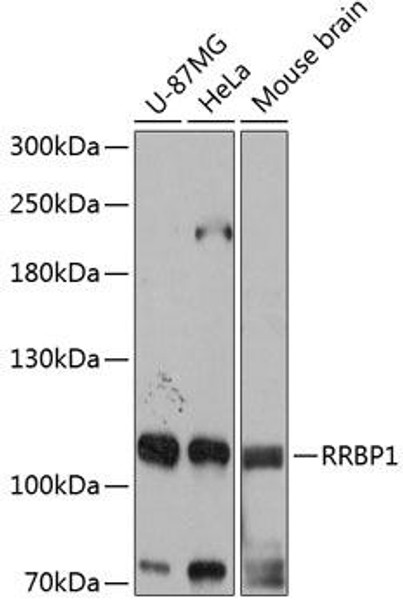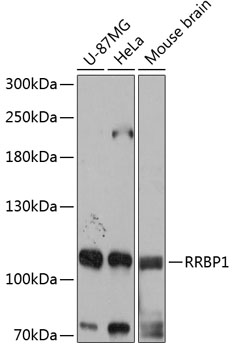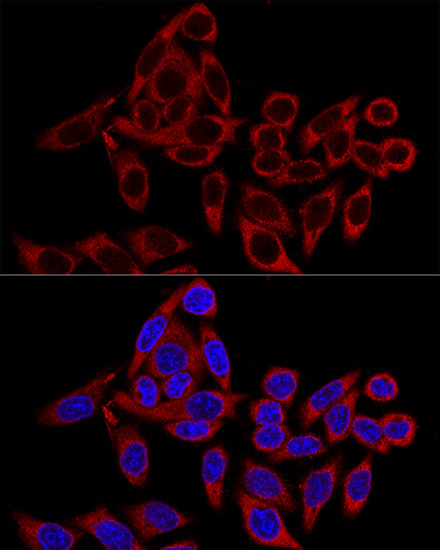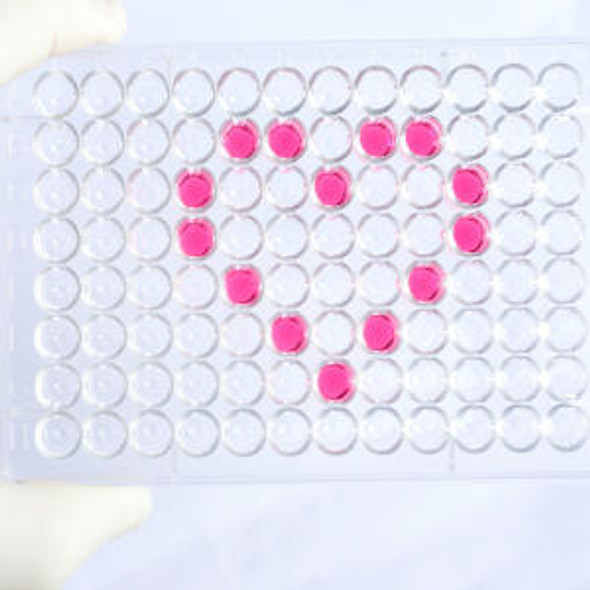Anti-RRBP1 Antibody (CAB12239)
- SKU:
- CAB12239
- Product type:
- Antibody
- Reactivity:
- Human
- Mouse
- Rat
- Host Species:
- Rabbit
- Isotype:
- IgG
- Antibody Type:
- Polyclonal Antibody
- Research Area:
- Cell Biology
Frequently bought together:
Description
| Antibody Name: | Anti-RRBP1 Antibody |
| Antibody SKU: | CAB12239 |
| Antibody Size: | 20uL, 50uL, 100uL |
| Application: | WB IHC IF |
| Reactivity: | Human, Mouse, Rat |
| Host Species: | Rabbit |
| Immunogen: | Recombinant fusion protein containing a sequence corresponding to amino acids 1-140 of human RRBP1 (NP_004578.2). |
| Application: | WB IHC IF |
| Recommended Dilution: | WB 1:500 - 1:2000 IHC 1:50 - 1:200 IF 1:50 - 1:200 |
| Reactivity: | Human, Mouse, Rat |
| Positive Samples: | U-87MG, HeLa, Mouse brain |
| Immunogen: | Recombinant fusion protein containing a sequence corresponding to amino acids 1-140 of human RRBP1 (NP_004578.2). |
| Purification Method: | Affinity purification |
| Storage Buffer: | Store at -20°C. Avoid freeze / thaw cycles. Buffer: PBS with 0.02% sodium azide, 50% glycerol, pH7.3. |
| Isotype: | IgG |
| Sequence: | MDIY DTQT LGVV VFGG FMVV SAIG IFLV STFS MKET SYEE ALAN QRKE MAKT HHQK VEKK KKEK TVEK KGKT KKKE EKPN GKIP DHDP APNV TVLL REPV RAPA VAVA PTPV QPPI IVAP VATV PAMP QEKL ASSP KDKK |
| Gene ID: | 6238 |
| Uniprot: | Q9P2E9 |
| Cellular Location: | Endoplasmic reticulum membrane, Single-pass type III membrane protein |
| Calculated MW: | 108kDa/152kDa |
| Observed MW: | 120kDa |
| Synonyms: | RRBP1, ES/130, ES130, RRp, hES |
| Background: | This gene encodes a ribosome-binding protein of the endoplasmic reticulum (ER) membrane. Studies suggest that this gene plays a role in ER proliferation, secretory pathways and secretory cell differentiation, and mediation of ER-microtubule interactions. Alternative splicing has been observed and protein isoforms are characterized by regions of N-terminal decapeptide and C-terminal heptad repeats. Splicing of the tandem repeats results in variations in ribosome-binding affinity and secretory function. The full-length nature of variants which differ in repeat length has not been determined. Pseudogenes of this gene have been identified on chromosomes 3 and 7, and RRBP1 has been excluded as a candidate gene in the cause of Alagille syndrome, the result of a mutation in a nearby gene on chromosome 20p12. |
| UniProt Protein Function: | RRBP1: a single-pass type III membrane protein of the rough endoplasmic reticulum membrane. Acts as a ribosome receptor and mediates interaction between the ribosome and the endoplasmic reticulum membrane. Associated with the unfolded protein response (UPR) and has anti-apoptotic activity. Knockdown of RRBP1 induces ER stress, and is associated with a significant reduction in the expression of glucose-regulated protein 78 (GRP78). GRP78 regulates the UPR, is widely upregulated in cancer, and plays an important role in chemotherapy resistance in some cancers. Upregulated in many cancers: overexpressed in a high proportion of breast carcinoma cases tested, and is highly expressed in lung cancer tissue compared with adjacent normal tissues. Because RRBP1 appears to play a role in tumor cell survival, it may be a candidate for new targeted therapeutics. Three human isoforms are produced by alternative splicing. |
| UniProt Protein Details: | Protein type:Membrane protein, integral; Translation; Ribosomal Chromosomal Location of Human Ortholog: 20p12 Cellular Component: endoplasmic reticulum; integral to endoplasmic reticulum membrane; membrane; ribosome Molecular Function:receptor activity Biological Process: osteoblast differentiation; translation |
| NCBI Summary: | This gene encodes a ribosome-binding protein of the endoplasmic reticulum (ER) membrane. Studies suggest that this gene plays a role in ER proliferation, secretory pathways and secretory cell differentiation, and mediation of ER-microtubule interactions. Alternative splicing has been observed and protein isoforms are characterized by regions of N-terminal decapeptide and C-terminal heptad repeats. Splicing of the tandem repeats results in variations in ribosome-binding affinity and secretory function. The full-length nature of variants which differ in repeat length has not been determined. Pseudogenes of this gene have been identified on chromosomes 3 and 7, and RRBP1 has been excluded as a candidate gene in the cause of Alagille syndrome, the result of a mutation in a nearby gene on chromosome 20p12. [provided by RefSeq, Apr 2012] |
| UniProt Code: | Q9P2E9 |
| NCBI GenInfo Identifier: | 23822112 |
| NCBI Gene ID: | 6238 |
| NCBI Accession: | Q9P2E9.4 |
| UniProt Secondary Accession: | Q9P2E9,O75300, O75301, Q5W165, Q96SB2, Q9BWP1, Q9H476 A2A2S6, A6NCN6, |
| UniProt Related Accession: | Q9P2E9 |
| Molecular Weight: | 108,632 Da |
| NCBI Full Name: | Ribosome-binding protein 1 |
| NCBI Synonym Full Names: | ribosome binding protein 1 |
| NCBI Official Symbol: | RRBP1 |
| NCBI Official Synonym Symbols: | RRp; hES; ES130; ES/130 |
| NCBI Protein Information: | ribosome-binding protein 1 |
| UniProt Protein Name: | Ribosome-binding protein 1 |
| UniProt Synonym Protein Names: | 180 kDa ribosome receptor homolog; RRp; ES/130-related protein; Ribosome receptor protein |
| Protein Family: | Ribosome-binding protein |
| UniProt Gene Name: | RRBP1 |
| UniProt Entry Name: | RRBP1_HUMAN |











